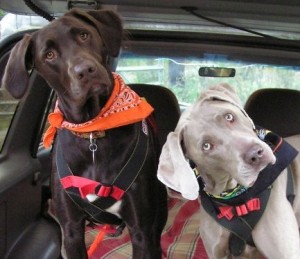 There is an old saying, “May you get what you deserve.” When I first heard it, I approved of the sentiment. What you put out in the world should come back to you. Do your best and the best of the world will come back to you. Imagine my surprise, years later, when someone described this saying to me as an old Jewish curse! So do we get the dog we deserve as well?
There is an old saying, “May you get what you deserve.” When I first heard it, I approved of the sentiment. What you put out in the world should come back to you. Do your best and the best of the world will come back to you. Imagine my surprise, years later, when someone described this saying to me as an old Jewish curse! So do we get the dog we deserve as well?
In her book, Oh Behave!, award winning author and dog trainer Jean Donaldson describes what she calls the “Owner Signature” on our dogs. Donaldson goes on to describe how our responses or non-responses to our dogs can have a profound effect on their behaviour and how they view and operate in their world. In fact, even the living situations we set up for our dogs will shape them in some way. Where they sleep, when they are fed, how and how often they are groomed, and dozens of other factors go into our dog’s “personality.”
There is no “right” or “wrong” way to live with dogs but, as Jean Donaldson suggests, all of these little nuances of our lifestyle with our dogs will have “ripples” in shaping who a dog becomes. Laughing at a dog for chewing up a cardboard box will have a different effect than a quick reprimand. And paying no attention to the dog as he happily shreds the box may produce a different result.
Your dog’s job
Whether we choose to acknowledge it or not, our dogs are engaged full time in observing us and our living patterns. From the time they arrive in our homes, their first priority is to survive. That means watching carefully for what brings good stuff for them and what results in bad consequences. The detail with which our dogs scrutinize and analyze their daily routine is amazing. It seems that within weeks of coming into my home, a new puppy will learn the body language that means I am going to take them out.
Dogs have evolved as a scavenger species. Their best bet for survival is to find ways to co-exist with us in ways that bring them the greatest benefits. Given the variety of humans and their lifestyles, it really shouldn’t be surprising that dogs are so good at observing us and developing a catalog of our behaviours for their reference. Whether we want to acknowledge it or not, we are being watched and our dog probably knows more about us than anyone else on the planet.
Greetings and solicitations
Once our dogs learn something about our behaviour, it seems they also learn about our likes and dislikes. They learn how to suck up to us for affection and learn just how much they can pester us before we will give in to their desires. They also learn what makes us angry and how to cope with that anger to relieve the unpleasantness of the situation. So when we return home to find our dog has gotten into the trash and they slink over to us looking “guilty” for what they have done, it is much more likely that they are just behaving in a way that they know will take the edge off of our angry response. They are not really feeling “guilty” at all, just trying to minimize the unpleasantness of the situation.
 For others, returning home can be a frenzy of jumping and whining and licking in greeting. Many a dog owner has responded with “Alright! Alright! I know! I’m home” while bending down to calm the dogs and move them back into the house. Little do they realize that they are not discouraging the frantic display at all but actually encouraging it by giving the dogs the attention they are looking for! I’m often amused by the dog owner who manages this kind of greeting only to turn to me and say “I don’t know why they keep doing this, I keep telling them to get off but every day it’s the same greeting.”
For others, returning home can be a frenzy of jumping and whining and licking in greeting. Many a dog owner has responded with “Alright! Alright! I know! I’m home” while bending down to calm the dogs and move them back into the house. Little do they realize that they are not discouraging the frantic display at all but actually encouraging it by giving the dogs the attention they are looking for! I’m often amused by the dog owner who manages this kind of greeting only to turn to me and say “I don’t know why they keep doing this, I keep telling them to get off but every day it’s the same greeting.”
The one thing that our dogs cannot observe is our intentions. And this can sometimes turn the dog owner’s world upside down. The intention might be to tell the dog that something is not appropriate by bending down, pushing them away and scolding them. From the dog’s perspective, their efforts have produced the desired effect, they have solicited and gotten both physical and verbal attention from the owner. You may intend to discourage the behaviour but if it continues or even gets more frequent or persistent, we are actually rewarding or encouraging the behaviour. The results are the opposite of the intention.
Every minute you are not training your dog…
Every minute you are not training your dog, your dog is still learning whether you realize it or not. They are always watching and evaluating the outcome of every situation. They are looking to see if they need to do more of something or less of something to get what they want. Dog owners ignore this simple fact at their own peril. If you are not as aware of your situations together as your dog is, they may end up training you!
I see this most frequently with dogs who are persistent. Whether it is barking or whining or pacing or nipping to get what they want, these dogs will repeat the behaviour over and over. Often the owners start out resolute that they will ignore this behaviour and not give in to the dog. But as the minutes wear on and life’s demands weigh on them, they eventually give in out of convenience, just to get the dog to stop the annoying behaviour. What the dog learns is that if they just keep it up long enough, they will get the results they want.
One approach to this is to use punishment with the dog. Whether it is yelling at the dog, putting them in a time out, or even using a physical correction, the goal is to make the consequence of the annoying behaviour more trouble than it is worth for the dog. But this approach comes with an interesting side effect. You may intend to stop the dog from barking at you to go outside but we already know that dogs can’t see intentions. Unless you are careful, you may actually discourage the dog from coming into the room you were in when you corrected him. Or stepping on carpets. Or coming close enough to you that you could poke him. When you stop a behaviour, you may be stopping more than you bargained for and maybe even stopping things you didn’t mean to stop.
The dog we deserve
 The alternative for me has been to remain mindful of my dogs while I am with them. This can be a lot of mental effort, particularly when we have puppies (who seem to soak up everything like little sponges) in the house. But we have found that if we are consistent with our dogs from the beginning, things can fall into place pretty quickly. By carefully responding to our dogs in ways that they understand, we make sure that they know that certain strategies to get what they want will not be successful. We’re also careful to encourage those behaviours we want by providing them the rewards they like when they give them to us.
The alternative for me has been to remain mindful of my dogs while I am with them. This can be a lot of mental effort, particularly when we have puppies (who seem to soak up everything like little sponges) in the house. But we have found that if we are consistent with our dogs from the beginning, things can fall into place pretty quickly. By carefully responding to our dogs in ways that they understand, we make sure that they know that certain strategies to get what they want will not be successful. We’re also careful to encourage those behaviours we want by providing them the rewards they like when they give them to us.
Patience is a big deal in our house. Our dogs are taught to wait at the door, to wait for their bowls at meal times, we practice having them wait for treats instead of snatching them from our hands. The message here is that the calm dog gets the good stuff and the pushy dog can wait. What has been surprising for us is the speed with which other dogs come to accept our routine when they come to stay with us. There will be a few days where the guest dogs will try out the strategies they use at home only to settle into our routines in a relatively short time.
Do we get the dogs we deserve? Yes, I think we do. We do that by accepting what they give us or by teaching them what we prefer from them. Some people even make a practice of teaching their dog that most of their behaviours are not acceptable and that way assuring that the dog will not act out. As I said at the beginning of this article, there is no right or wrong way about it.
So is it a blessing or a curse? We all have the dogs we deserve. We have, for good or ill, placed our “signature” upon them and they are, in large measure, what we have made them. We have done that through conscious effort or sometimes as a result of our sporadic inattention to them. But they are ours and they are who we have shaped them to be. The good news is that it is never too late to change the dynamics if you want something a little different.
Until next time, have fun with your dogs.
The first Canine Nation ebook is now available –
“Dogs: As They Are”
Photo credits –
Pampered – *- mika -* 2006 From Flickr
Questions – Kemal Y. 2006 From Flickr
Not Going – Darwin Bell 2006 From Flickr

 In the Canine Nation Store!!!
In the Canine Nation Store!!! 

Well said and so very true 🙂